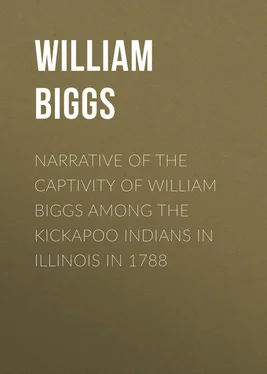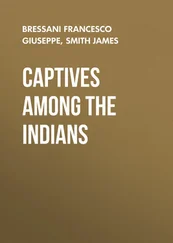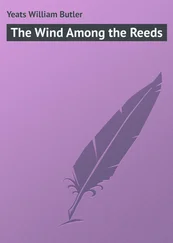They then told me to march; an Indian took hold of each of my arms, and led me back to where they shot at me, and then went about half a mile further off the road, where they had encamped the night before and left their blankets and other things. They then took off my under coat and tied my hands behind my back, and then tied a rope to that, tying about six or seven feet long, we then started in a great hurry, and an Indian held one end of the rope while we were marching. There were but eight Indians marched in company with me that morning from the camp. The other eight took some other route, and never fell in with us again, until some time after we got to their towns. We had marched about three or four miles from that camp when Vallis arrived at the fort, about six miles from where they caught me, where they fired a swivel to alarm the people who were out of the fort – when the Indians heard the swivel they were very much alarmed, and all looked that way and hallowed yough, yough. They then commenced running, and run in a pretty smart trot of a run for five or six miles before they halted, and then walked very fast until about 2 o'clock in the afternoon, when they separated, I supposed to hunt, having nothing to eat. The old chief and one of the other Indians kept on a straight course with me, we traveled about three miles, when we got a little way into a small prairie and halted about fifteen minutes, there one of the party fell in with us, he had killed a bear and brought as much of the meat with him as he could carry. We then crossed the prairie and came to a large run about one mile and a half from where we had halted to rest. By this time three Indians had joined us. We halted there, made a fire and roasted the bear meat, the other two Indians staid behind as spies. Whilst the meat was cooking, the Indians held a council what they would do with the Indian that wanted to kill me. He was a young fellow about 19 years of age and of a different nation, being a Pottowatema. They did not want him to go to war with them; they said he was a great coward and would not go into danger till there was no risk to run, then he would run forward and get the best of the plunder, and that he would not be commanded; he would do as he pleased; was very selfish and stubborn; and was determined to kill me if he could get a chance. They determined in their council to kill him. It is a law with the Indians when they go to war, if an Indian will not obey the counsels and commands of his captain or chief, to kill them. When their meat was cooked, they ate very hearty, and when they were done eating, three of the Indians got up, put on their budgets and started, this young Indian was one of them. I also got up to show a willingness to be ready. The old chief told me to sit down, and the three Indians started off. In about three or four minutes after we started, but varied a little in our course. We had not traveled more than one hundred yards when we heard the report of a gun. The old chief then told me that they had killed the Indian that wanted to kill me. The other two Indians fell in company with us before night. We then traveled till about 10 o'clock in the night, when we encamped at a large grove of timber in a prairie, about four miles from the edge of the woods; made no fire that night. We traveled about forty miles that day. After they rested a while they sat down to eat their jirk. They gave me some but I could not eat any. After they were done eating, one of the Indians was sitting with his back against a tree, with his knife between his legs. I was sitting facing him with my feet nearly touching his. He began to inquire of me of what nation I belonged to. I was determined to pretend that I was ignorant and could not understand him. I did not wish them to know that I could speak some Indian language, and understand them better than I could speak. He first asked me in Indian if I was a Matocush, (that is a Frenchman in English). I told him no. He asked me if I was a Sagenash, (an Englishman). I told him no. He again asked if I was a Shemolsea, (that is a long knife or a Virginian). I told him no. He then asked me if I was a Bostonely, (that is American). I told him no. About one minute afterwards, he asked me the same questions over again. I then answered him yes; he then spoke English and caught up his knife in his hand, and said "you are one dam son of a bitch." I really thought he intended stabbing me with his knife. I knew it would not do to show cowardice, I being pretty well acquainted with their manner and ways. I then jumped upon my feet and spoke in Indian and said manetway, kien, depaway, in English it is no, I am very good, and clapped my hand on my breast when I spoke and looked very bold; the other Indians all set up such ha! ha! and laugh that it made the other Indian look very foolish. He sat still and looked very sulky. After they had rested a while, they began to prepare to lay down. They spread down a deer-skin and blanket for me to lay on. They had tied a rope around my arms above my elbows, and tied that rope across my back, and a rope around my neck; they then tied the end of another rope behind to the neck rope, then down my back to the pinion rope; then they drew my hands forward across my stomach and crossed my wrists; then tied my wrists very tight; then tied my legs together, just below my knees; then tied my feet together with a rope round my ankles; then took a small cord and tied in between my wrists, and also between my ankles very tight, in order to prevent me from drawing out my hands or feet; they then took another cord and tied one end to the neck rope; then to the hand rope; then from the hand rope to the knee rope; they then took a rope about six feet long and tied one end to the wrist rope, and the other end to a stake about six feet from me stretched very tight, and an Indian laid on that rope all night; then they took another rope about the same length, and tied one end to the knee rope and the other end to a stake, and another Indian laid on that all night; then they tied a large half-dressed elk rope, one end to the back part of the neck rope which made a knot as big as my fist, the other end they tied to a stake about six feet from my head. When they finished their tying me, they covered me with a blanket. They tied me in the aforegoing way nine nights in succession; they had me stretched and tied so tight, that I could not move one inch to turn or rest myself; that large knot was on the back of my neck, so that I was obliged to lay on it all night, and it hurt my neck very much. I never suffered as much in the same length of time in all my life; I could hardly walk when we got out to their town. They never made me carry anything except a blanket they gave me to keep myself warm, when they took all my clothes from me. The Indians carried a deer-skin and blanket all the way for me to lodge upon. When my hands and feet became sore with the tying the Indians would always pull off my moccasins at night and put them on in the morning, and patch them when they would require it.
Конец ознакомительного фрагмента.
Текст предоставлен ООО «ЛитРес».
Прочитайте эту книгу целиком, купив полную легальную версию на ЛитРес.
Безопасно оплатить книгу можно банковской картой Visa, MasterCard, Maestro, со счета мобильного телефона, с платежного терминала, в салоне МТС или Связной, через PayPal, WebMoney, Яндекс.Деньги, QIWI Кошелек, бонусными картами или другим удобным Вам способом.












